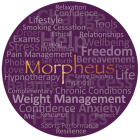Eating Disorders
word definitions taken from Wikipedia
Eating disorders refer to a group of conditions defined by abnormal eating habits that may involve either insufficient or excessive food intake to the detriment of an individual’s physical and mental health. Bulimia nervosa, anorexia nervosa, and binge eating disorder are the most common specific forms in the United States. Though primarily thought of as affecting females (an estimated 5–10 million being affected in the U.S.), eating disorders affect males as well (an estimated 1 million U.S. males being affected). Although eating disorders are increasing all over the world among both men and women, there is evidence to suggest that it is women in the Western world who are at the highest risk of developing them and the degree of westernization increases the risk.
The precise cause of eating disorders is not entirely understood, but there is evidence that it may be linked to other medical conditions and situations. One study showed that girls with ADHD have a greater chance of getting an eating disorder than those not affected by ADHD. One study showed that foster girls are more likely to develop bulimia nervosa. Some also think that peer pressure and idealized body-types seen in the media are also a significant factor. However, research shows that for some people there is a genetic reason why they may be prone to developing an eating disorder.
While proper treatment can be highly effective for many of the specific types of eating disorder, the consequences of eating disorders can be severe, including death (whether from direct medical effects of disturbed eating habits or from comorbid conditions such as suicidal thinking).
Anorexia Nervosa (AN), characterised by refusal to maintain a healthy body weight, an obsessive fear of gaining weight, and an unrealistic perception of current body weight. Anorexia can cause menstruation to stop, and often leads to bone loss, loss of skin integrity, etc. It greatly stresses the heart, increasing the risk of heart attacks and related heart problems. The risk of death is greatly increased in individuals with this disease.
Bulimia Nervosa (BN), characterised by recurrent binge eating followed by compensatory behaviours such as purging (self-induced vomiting, excessive use of laxatives/diuretics, or excessive exercise) Bulimics may also fast for a certain amount of time following a binge.
Binge Eating Disorder (BED) or compulsive overeating, characterized by binge eating, without compensatory behaviour.
Compulsive Over Eating (COE)
Purging Disorder, characterized by recurrent purging to control weight or shape in the absence of binge eating episodes.
Rumination, characterised by involving the repeated painless regurgitation of food following a meal which is then either re-chewed and re-swallowed, or discarded.
Diabulimia, characterised by the deliberate manipulation of insulin levels by diabetics in an effort to control their weight.
Food Maintenance, characterised by a set of aberrant eating behaviours of children in foster care.
Eating disorders not otherwise specified (EDNOS) can refer to a number of disorders. It can refer to a female individual who suffers from anorexia but still has her period, someone who may be at a “healthy weight”, but who has anorexic thought patterns and behaviours, it can mean the sufferer equally participates in some anorexic as well as bulimic behaviours (sometimes referred to as purge-type anorexia), or to any combination of eating disorder behaviours which do not directly put them in a separate category.
Pica, characterised by a compulsive craving for eating, chewing or licking non-food items or foods containing no nutrition. These can include such things as chalk, paper, plaster, paint chips, baking soda, starch, glue, rust, ice, coffee grounds, and cigarette ashes. These individuals cannot distinguish a difference between food and non-food items.
Night eating syndrome, characterised by morning anorexia, evening polyphagia (abnormally increased appetite for consumption of food frequently associated with insomnia, and injury to the hypothalamus).
Orthorexia nervosa, a term used by Steven Bratman to characterise an obsession with a “pure” diet, where it interferes with a person’s life.
How can Morpheus Associates help?
Hypnotherapy is used successfully to help people deal with a wide range of conditions. It is widely recognised now in its success with helping people with relaxation, and techniques are used to help people manage stress and anxiety associated with many other conditions. The client normally awakes feeling re energised and revitalised, with new hope and a positive frame of mind.
We offer an Initial 15-20 minute consultation which is free. At the end of this consultation you will be asked if you wish to proceed. At which point we will explain the fees per session, relevant to the treatment recommended and how many sessions are suggested as being required. We are located at Clarice House in Ipswich, The Heritage Centre Bury St Edmunds, Clarice House Colchester and Harley Street London. If a course of treatment is recommended, subsequent sessions are offered at a discounted price. Payments are accepted by cash or cheque with guarantee card only.
Please feel free to read our recent testimonials (link) from clients who have had this condition treated by Morpheus Associates
If you are comfortable with the idea, please call us to book an Initial 15-20 minute consultation, at which time you can decide if you feel the treatment offered would possibly help. Call Debbie Crooks on 07840-694743.

